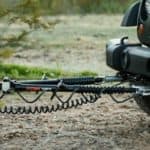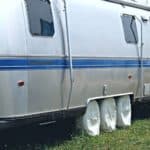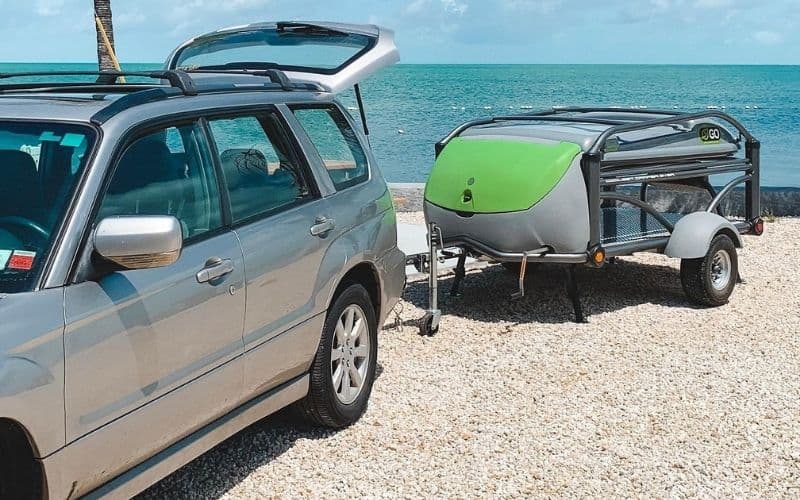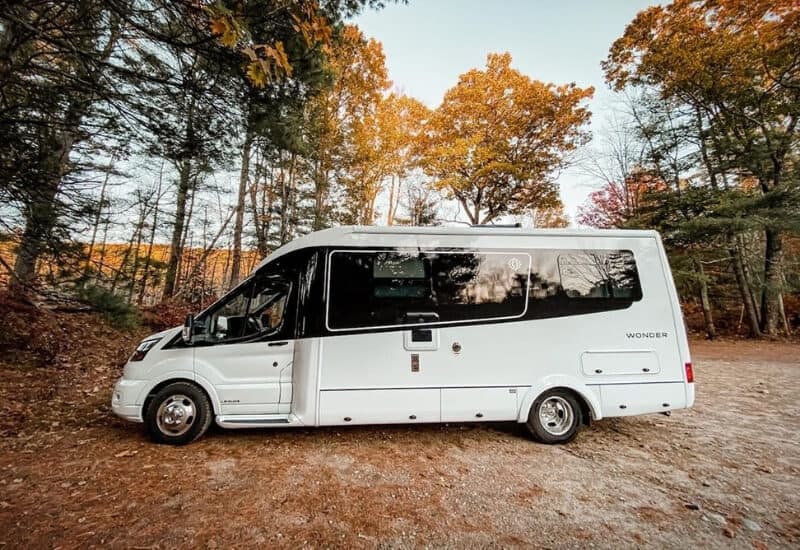Finding the best travel trailers for boondocking can turn a simple getaway into an extraordinary adventure into the wild.
With my years of experience camping off-grid, I’ve had the privilege of testing and thoroughly enjoying a variety of RVs designed for the unique demands of dry camping.
From self-contained units that offer the freedom to camp anywhere to trailers specifically engineered for rugged terrain, the right choice can significantly enhance your outdoor experience.
Among all models I’ve tested, the Rockwood Geo Pro stands out as the best overall for its balance between comfort and off-grid capability.
It’s a game-changer for those looking to merge the serenity of remote locations with the comforts of home.
Let me guide you through the top contenders that have proven their worth in the wild, facilitating your quest for the ultimate boondocking experience.
Based on my experience, the top travel trailers are:
- Rockwood Geo Pro: Best overall for blending comfort with off-grid capability.
- Winnebago Hike: Great for adventurers seeking a versatile off-grid camper.
- Airstream Basecamp: Excellent choice for stylish, comfortable dry camping.
- Taxa Mantis Trailer: Top pick for families or larger groups needing space in a boondock trailer.
- Timberleaf Teardrop Camper: Ideal for those prioritizing a lightweight and easy-to-tow camper.
- Conqueror Overland Adventure Trailer: Superb for extreme off-road conditions and long-term boondocking.
Can you Boondock in a Travel Trailer?
Before we get to the goods, we should probably address one of the most important questions of this article: Can you boondock in a travel trailer?
It is actually a fantastic question, as many full-timers and avid boondockers love larger rigs like Class As and fifth wheels; simply because they have so much living space and water storage.
Nevertheless, travel trailers are equally as popular because they are generally lighter and easier to tow, allowing you to explore a variety of landscapes.
So, YES. You can absolutely boondock in a travel trailer.
Of course, there will pros and cons to any setup; travel trailers are typically smaller, therefore they usually don’t hold as much water storage. With this comes less living and storage space as well.
Nevertheless, if you’re a minimalist at heart, a travel trailer may be the perfect rig to travel off-grid with.
Depending on the type and size of the travel trailer, they can be towed by all different types of tow vehicles (for example, SUVs, Jeeps, and trucks); and you’ll find a variety of travel trailers outfitted for rough terrain (i.e., high clearance, all-terrain tires, robust framing, etc).
Now that we’ve addressed the most pressing question, lets talk about size.
What Size Travel Trailer is best for Boondocking?
![Best RV for Boondocking in [currentyear] for Off-Grid Travel Trailer Adventures 2 What Size Travel Trailer is best for Boondocking](https://www.rvingknowhow.com/wp-content/uploads/2021/10/What-Size-Travel-Trailer-is-best-for-Boondocking.jpg)
Yes, size matters – for boondocking, that is; and there are several factors to consider when deciding which is the best travel trailer for off-grid living.
When it comes to manueaverability through tight spaces, soft sand, or washed-out roads, smaller is always better.
That being said, you don’t want to go too small. Chances are, if you want to get away from it all, you’ll need to bring enough gear and provisions to actually enjoy your time off-grid; not to mention fresh water, grey water, and black water storage.
Think of it this way: there is a constant give and take between size and stuff when it comes to boondocking.
You can zip around easily with a tiny rig, but it just won’t hold the water, gear, food, and comforts that you might like (or frankly, need).
This is why we believe that a small to medium sized travel trailer is the best for off grid-living.
Specifically, somewhere between 13 and 25 feet long. Any smaller than 13 feet, and you just won’t have the water storage to stay out for any length of time; any longer than 25 feet and you may not be able to fit in some of the amazing, secluded spots that many boondockers enjoy.
But, of course, people make it work in a variety of different rigs. Hell, I made it work in a 35’ Class A (and learned it would have been so much easier in a small travel trailer)!
Sometimes you simply don’t know what works until you get out there and live it!
Why Boondock?
If you clicked on this article, you probably already know – boondocking is amazing. Whether you’ve already experienced the rush of finding that PERFECT free campsite, or you’re obsessively dreaming and watching videos on YouTube – I know you feel that itch, too.
That itch to explore land untouched by humans; to wake up to awe-inspiring views without paying a DIME. I’ve been there, and I can tell you – it’s just as incredible as you’re imagining.
But before I dive into WHY you should boondock, let me explain what boondocking means:
In short, boondocking is dry, dispersed camping. Boondockers typically camp on free, public lands without direct access to water, electricity, or sewage hookups.
It is a pack-in/pack-out situation, in which you’re in a self-contained RV, van, skoolie, or some other type of home on wheels.
As soon as I decided that I didn’t want an ordinary nine-to-five job with a mortgage to pay, off-grid living became appealing to me – specifically, boondocking.
When I discovered this way of life, I knew it was perfect for my lifestyle. You mean, I don’t HAVE to rely on the grid? I can camp in stunning locations for FREE? I can hit the road whenever I please and head to another amazing destination?
My freewheeling heart was in love with the idea, and after living and traveling in my RV for a year (and boondocking for most of it), I want to tell you why you’ll love boondocking too:
Yes, boondocking is a way to save money and experience nature, but it is so much more than that.
It’s a way to connect with your true self and others with the same passions. It’s a daily grind of both conserving and seeking out resources that keep you alive.
It’s a gratifying struggle that leaves you feeling fulfilled in the deepest sense.
Yeah, living off-grid (especially for months on end) is one of the best things I’ve ever done.
And believe it or not, it’s relatively easy to do – as long as you have the right rig.
So, what features are essential for boondocking?
I’m glad you asked.
Features Your Camper or RV Needs For Living Off-Grid
![Best RV for Boondocking in [currentyear] for Off-Grid Travel Trailer Adventures 3 Must-have Features in an Off-grid RV](https://www.rvingknowhow.com/wp-content/uploads/2021/10/Must-have-Features-in-an-Off-grid-RV.jpg)
The best boondocking travel trailer is going to be slightly different for everyone. If you have an adventurous spirit and are happier with less, you may want to go with a small, minimalistic camper.
If you’re a family that loves to explore but also craves certain comforts from home, you may want a larger camper equipped with a full solar setup and huge water storage tanks.
The good news is: there is a rig out there for everyone. But in general, the best off-grid travel trailers have certain features that make it easier to go off the beaten path AND live there, too.
1. Your rig should be lightweight
I’ll never forget the time my husband and I had to navigate our massive Class A motorhome over a washed-out road in an attempt to find a free place to camp – I was convinced we were going to end up on our side.
It was then that I realized a lighter, rugged camper is essential for off-grid camping.
To put it plainly, lighter travel trailers can handle rough terrain much better than heavy ones; there is less risk of tipping over or getting stuck, and they will put less strain on your tow vehicle as you maneuver rocky or mountainous landscapes.
Take it from me; if you plan on boondocking regularly, you will want a sturdy, lightweight camper. You simply never know what the “roads” will be like driving to your next spot.
2. You’ll want a lot of water storage
While some of the more minimalistic rigs hold less water, I felt this was important to talk about. Why? Because the more water you can store, the longer you can boondock!
Unfortunately, with any setup there are going to be some trade-offs; smaller lightweight travel trailers will generally have smaller tanks than larger rigs.
Nevertheless, it is important to consider how much water you can take with you during your off-grid excursions (not to mention how much black and grey water you can hold!).
Even if your rig only holds a small amount of fresh, black, and grey water, there are several ways to extend your camping stay.
Consider bringing a couple 5-gallon water jugs with you; you can always bring these to your closest gas station and ask to use the spigot.
You may also want to consider a composting toilet like the Nature’s Head, as it will help you conserve your water and eliminate the black tank altogether.
3. Solar with a high-powered inverter
It might seem difficult to bite the bullet and invest in a solar setup, but I guarantee you will be happy that you did.
There is no better feeling than having a rig that is outfitted to power itself off such an abundant and effortless resource.
Besides, a good solar setup will practically eliminate the need for a backup generator – which is a whole other expense!
Most of the travel trailers we discuss below are either equipped with solar or have the option to be equipped with solar.
Even if you decide to wait on a setup, you’ll at least want the option to change your mind in the future!
4. 12-volt and propane appliances
If you want to be free from shore power, you’ll definitely want your systems and appliances to run off either 12-volts or propane.
This includes your refrigerator, hot water heater, furnace, water pump, and anything else that requires power to function.
My favorite RVs are the ones that run appliances off of multiple different power sources.
For instance, a water heater that runs off both propane and electric; or a fridge that runs off propane, 12-volts, and shore power. These will give you several different options for power in any situation.
5. High ground clearance and all-terrain tires
This one speaks for itself; if you’re going to trek off-road, you’ll want to feel confident that your trailer won’t bottom out on washed-out roads, or get stuck altogether.
The all-terrain tires coupled with the lightness of the trailer will allow your rig to navigate rocky surfaces with ease.
In addition, the high clearance will allow you to boondock in some of the most secluded places.
These features are definitely a must for traveling off-grid, as most of the dirt roads you will encounter are not maintained!
6. Sturdy framing
Three words: metal, metal, metal. You definitely want your rig to be constructed of solid materials such as steel and aluminum; and steer clear of wood construction at all costs.
Not only can wood break or fall apart when traversing harsh terrain, but it’s also susceptible to water damage.
And as we all know, nothing puts a damper on camping like mold and rot in your home on wheels.
6 most capable boondocking Camper Trailers for Off-grid Living
Now for the best part, and the reason you clicked on this article in the first place: badass travel trailers!
We picked these rigs because they have all the features we discussed above; they’re outfitted with solar (or have the option for solar), made of solid construction, and have appliances that can run without shore power.
So, without further delay, here are 6 amazing travel trailers for off-grid living:
1. Rockwood Geo Pro
![Best RV for Boondocking in [currentyear] for Off-Grid Travel Trailer Adventures 4 Rockwood Geo Pro](https://www.rvingknowhow.com/wp-content/uploads/2021/10/Rockwood-Geo-Pro-.jpg)
The Rockwood Geo Pro lineup is unbelievable when it comes to off-grid living. It truly seems like they thought of everything when designing this series – especially the new travel trailers.
The once optional off-road package is now standard in all models; this includes 15-inch Mud Rover radial tires along with a lift kit. They also upgraded the solar from 100-watts to 190-watts, which comes with a 1000-watt inverter.
My other favorite features include the heated holding tanks, the 12-volt fridge (instead of gas/electric), the antenna/wifi booster, and the gas/electric water heater.
(Side note: our motorhome had a gas/electric water heater and we loved having the two different options).
You will also find a variety of different floor plans – they have everything from an 11-foot travel trailer to a 20-foot toy hauler. Pretty awesome, right?
2. Winnebago Hike
![Best RV for Boondocking in [currentyear] for Off-Grid Travel Trailer Adventures 5 Winnebago Hike](https://www.rvingknowhow.com/wp-content/uploads/2021/10/Winnebago-Hike.jpg)
Like the Geo Pro, the Winnebago Hike comes in a variety of models and floor plans. It ranges from 20’ to 25’ long and sleeps between 3 and 4 people, making this a great off-grid RV for small families.
The Hike comes with off-road tires, off-set wheels, and robust fenders; allowing you to venture off the beaten path with ease. It also has an external exoskeleton that allows you to securely attach kayaks, bikes, and other adventure apparatuses.
This boondocking beast also comes with a gas/electric refrigerator, roof-mounted solar prep, and 31 gallons of freshwater capacity – all features that will make your off-grid adventure a little easier.
3. Airstream Basecamp
![Best RV for Boondocking in [currentyear] for Off-Grid Travel Trailer Adventures 6 Airstream Basecamp](https://www.rvingknowhow.com/wp-content/uploads/2021/10/Airstream-Basecamp-.jpg)
You didn’t think we could do a travel trailer roundup without including an Airstream, did you? Airstream came out with its Base Camp model in 2017 and has been improving it ever since. It offers the classic aluminum body and durability that we love about Airstreams – just in a smaller package.
The 20-foot Airstream Basecamp costs $45,900 without any upgrades, but if you plan on camping away from people and pavement, I highly suggest getting the X upgrade. It will cost you an extra $3,000, but you’ll get extra window protection, robust rims and tires, an axel lift, and rock shields on the front of the body.
Not only that, but for an extra $2,400, you can completely outfit your Basecamp with solar. This upgrade includes two 90-watt solar panels, a solar charge display and controller, and two group 24 series 80-hour batteries.
Even if you choose not to go with the upgrades, you’ll still be sitting pretty without hookups. The furnace and the water heater both run off propane, while the refrigerator runs off 12-volts.
Likewise, the insulated water tanks are heated with 12-volt heating pads! These hold 27 gallons of freshwater, 28 gallons of greywater, and 21 gallons of black water.
Feeling excited yet? If I could afford it, I would be, too!
4. Taxa Mantis Trailer
![Best RV for Boondocking in [currentyear] for Off-Grid Travel Trailer Adventures 7 Taxa Mantis Trailer](https://www.rvingknowhow.com/wp-content/uploads/2021/10/Taxa-Mantis-Trailer-.jpg)
Let’s switch it up a bit, shall we? The Taxa Mantis trailer is an extremely well-thought-out adventure-abode. It’s smaller than the travel trailers we’ve discussed so far, but don’t let that confuse you; this little thing is a beast. It truly has just about everything you could want in a small, durable package.
The Mantis is a light and easy-to-tow pop-up travel trailer; however, it opens up dramatically to sleep up to 7 adults (if you include the rooftop tent and hammock option).
The body is made with high-quality materials such as aluminum and EPS foam and includes gravel guards in front for extra protection.
Another upgrade includes a cassette toilet with a removable black tank. It comes along with a wet bath that is stored away so ingeniously, you won’t even know it’s there. And I have to say – having a removable black tank is EVERYTHING when it comes to boondocking.
All you have to do is take it to your closest bathroom and dump it (in other words, you won’t have to break camp and potentially lose your amazing free spot!).
The Mantis is also pre-wired for solar panels, has a 12-volt outlet for the fridge, and holds 20 gallons of fresh water and 22 gallons of greywater. Honestly, I could write an entire article in itself about all the small innovative features in this rig, but I encourage you to check it out yourself!
5. The Timberleaf Teardrop Camper
![Best RV for Boondocking in [currentyear] for Off-Grid Travel Trailer Adventures 8 Timberleaf Teardrop Camper](https://www.rvingknowhow.com/wp-content/uploads/2021/10/Timberleaf-Teardrop-Camper-.jpg)
Are you looking for a well-built teardrop camper? Maybe one that can traverse nearly any terrain? If your answer is yes, the Timberleaf Teardrop just may be your perfect travel trailer. It is made of aluminum with R-7 insulated walls and a zero-VOC polyurethane wood interior.
It comes with a queen-sized bed, a functional outdoor kitchen, 2 doors, 2 windows, and a huge skylight.
Even though it is such a tiny setup, it will go anywhere a rugged 4×4 can go; dessert boondocking, mountain boondocking – you name it.
It also comes with 11 gallons of freshwater, 100-amp hour deep cell marine batteries, a power center that manages all the 110-volt power, inverter, and 12-volt power, 4 USB outlets, and two 110-volt outlets – impressive for such a minimal setup!
6. Conqueror Overland Adventure Trailer
![Best RV for Boondocking in [currentyear] for Off-Grid Travel Trailer Adventures 9 Conqueror Overland Adventure Trailer](https://www.rvingknowhow.com/wp-content/uploads/2021/10/Conqueror-Overland-Adventure-Trailer.jpg)
Ok, guys. I saved this one for last because it’s my absolute favorite. The Conqueror truly lives up to its name – it will conquer any off-road adventure you decide to take it on.
These indestructible little trailers have been tested and retested through the harshest terrains of Africa for decades; and honestly, they’re probably the most rugged campers in our line-up.
First and foremost, it has an epic suspension system that can glide over the rockiest terrain with ease. It’s also built without any degradable materials such as wood or fiberglass. To put it plainly, it’s made to last and will probably outlive my children’s children.
Even though it is an extremely lightweight trailer, it has just about everything you could want for your off-grid excursion.
The UEV-440 model has 42 gallons of fresh water storage, an on-demand propane water heater, an outdoor shower and kitchen that have amazing amounts of storage space and functionality, and room for 4 adults to sleep comfortably – all within a compact 93 square feet of space!
Don’t believe me? Check it out for yourself!
In Closing
All of these travel trailers have one thing in common: they’re built to take a beating. They’re made for RVers who crave adventure and want to explore the road-less-traveled.
And while these rigs have many features in common, they also provide a wide range of options for any traveler (or family of travelers!). Looking for a larger rig? You may want to check out the Rockwood Geo Pro or Winnebago Hike.
Looking for a rugged travel trailer that you can tow with an SUV or Jeep? The Timberleaf Teardrop just may be perfect for you! One thing is for sure; there is a camper for everyone in any situation.
Now tell us: What are your priorities when traveling off-grid? Is there anything we didn’t mention? Let us know in the comments below!

![Best RV for Boondocking in [currentyear] for Off-Grid Travel Trailer Adventures 1 Best Boondocking Travel Trailers](https://www.rvingknowhow.com/wp-content/uploads/2021/10/Best-Boondocking-Travel-Trailers.jpg)


![Top 7 Best Lightweight Pop Up Campers in [currentyear]: Small Tent Trailers and RVs for Easy Travel 12 Lightweight Popup Campers You Can Pull With A Small Tow Vehicle](https://www.rvingknowhow.com/wp-content/uploads/2021/01/Lightweight-Popup-Campers-You-Can-Pull-With-A-Small-Tow-Vehicle.jpg)


2 Comments
Linda Humphries
2 years agoHi. I’ve been researching the right travel trailer for boondocking for only a couple months. I have looked at every one of the 6 you mentioned here. Personally, I want a trailer that offers more and that I would feel safe in. The hybrids that have rooms that open up as tents would leave me unable to sleep. The kitchens and showers outside would mean being wet and cold in the winter months. Some are nothing more than sleeping quarters. And what happens if a slide out stops working in the out position, can you drive somewhere for repairs with it out? These are all things that I have thought of as I’ve done my research.
My research…or searching, has brough me to the MDC XT16HR. So far it is the only one that I have found that meets my needs. And it is beautiful. I will continue looking, as there is plenty of time for me. Let me know your thoughts on this travel trailer please.
Thanks for your information. Linda
Anna Highsmith
2 years agoHi Linda, this off road camper/trailer looks beautiful. What a wonderful find. I just started my search for a camper to start traveling on my own and be able to go to mountainous and/or off road locations without worries of the frame being too low, safety is a big priority for me too, and have the amenities all inside is best for me.